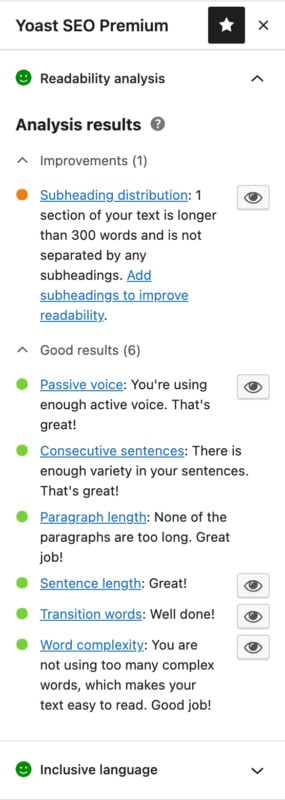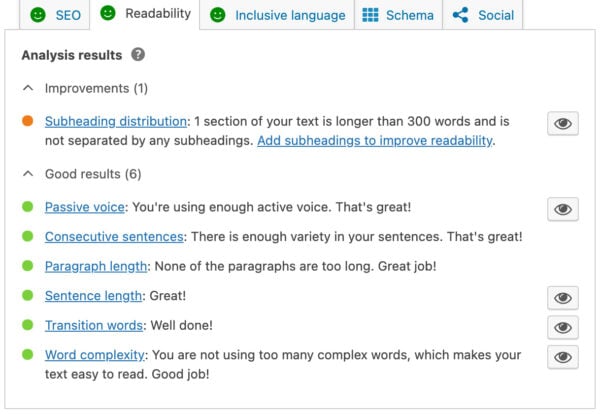How to use the readability analysis in Yoast SEO

If you’re a user of Yoast SEO for WordPress or Shopify, then you’re familiar with the traffic lights in our plugin. Three parts of Yoast SEO use this system: our content analysis, readability analysis, and inclusive language analysis. The first checks whether your post or product pages are SEO-proof, while the readability one checks if they’re readable for a general audience. The third one checks if your content has language that might exclude people. Of course, these are interconnected, as readable content is crucial if you want your site to do well in the search results. Here, we’ll show you how to use the readability analysis.
Key takeaways
- The readability analysis in Yoast SEO helps improve text clarity for SEO, ensuring it’s easily understood by users and virtual assistants.
- It provides real-time readability scores through a traffic light system, with green indicating good readability and orange or red signaling improvements needed.
- Users can find the readability analysis in the Yoast SEO sidebar in WordPress and Shopify, allowing easy adjustments while writing.
- Not every traffic light needs to be green; a mix is acceptable, as readability varies by industry.
- The readability analysis ensures that content ranks well in search engines while remaining accessible and enjoyable for readers.

Yoast SEO for Shopify
We have a Yoast SEO for Shopify app! Now, you can enjoy the benefits of Yoast SEO on your Shopify store too. Read more about our Shopify app on yoast.com, or go straight to the Shopify app store and get Yoast SEO for Shopify!
What does the readability analysis in Yoast SEO do?
The readability analysis in Yoast SEO uses an algorithm to determine how readable your text is. We’ve crafted this algorithm to make it as accurate as possible without being too strict. It features several checks that will give you advice when you write your page. In other words, following this advice makes your text easier to read and understand.
It has been said that Yoast SEO suggests oversimplifying your writing. Of course, that’s not the case. We merely want to help people write content that’s easy to understand. Just consider the following quote by content design hero Sarah Richards about making your content as readable for humans as possible:
“You’re not dumbing down, you’re opening up.”
By simplifying content, you’re automatically growing your audience as more people grasp the message of your content. Also, you’re not writing your content just for people anymore. Because virtual assistants like Alexa and Siri must also be able to work with it. Even Google increasingly uses well-written content for rich results like featured snippets, not to mention all the AI tools that love good content.
That being said, while the advice in the readability section is not the be-all and end-all advice, it does give you important clues to the perceived difficulty of your text. Writing with readability in mind is crucial, as readability ranks!
Current readability checks in Yoast SEO
The current readability checks are available in Yoast SEO:
- Transition words: Do you use transition words like ‘most importantly’, ‘because’, ‘therefore’, or ‘besides that’ to tie your text together? Using these words improves the flow of your article as they provide hints to the reader about what is coming next.
- Sentence beginnings: Do any of your consecutive sentences start with the same word? This might feel repetitive to your reader, and that can be annoying. Always keep your sentences varied, so your article is readable and free of obstacles. Unless you want to prove something or use it as a writing style, of course.
- Word complexity: It would be a shame if you write something and your readers can’t fully grasp it, right? The more uncommon and complicated words you use, the harder it might be for your visitors to understand your writing. Thanks to the feedback from this assessment, you can easily identify complex words and change them accordingly. We’ll highlight them for you so you don’t have to spend time looking.
- Paragraph length: Some people tend to use extremely long paragraphs. Doing so makes your text look daunting as it becomes just one big blob of text. Break it up, use shorter paragraphs and don’t forget to give your core sentences some thought.
- Subheading distribution: Similarly to long paragraphs, texts without subheadings are difficult to scan, which makes them rather daunting. So, we check if you use enough subheadings to guide your readers through the text and help them find what they’re looking for.
- Sentence length: Sentence length is one of the core aspects that can make a text hard to read. If most of your sentences are too long – over 20 words – people lose track of your point. Readers often have to jump back a few words to find out what you mean. This is very tiring and inefficient. Try to keep the number of words in a sentence in check. Shorten your sentences. Aim for easy understanding, not a complex literary masterpiece.
- Passive voice: Using a lot of passive voice in your text makes it appear distant, and your message will be less clear. Your sentences become wordy and difficult because the sentence structure is harder to understand. Whenever you use the passive voice, always consider whether a better, active alternative is available.
- Transition words: Do you use transition words like ‘most importantly’, ‘because’, ‘therefore’, or ‘besides that’ to tie your text together? Using these words improves the flow of your article as they provide hints to the reader about what is coming next.
- Sentence beginnings (doesn’t apply for Product pages): Do any of your consecutive sentences start with the same word? This might feel repetitive to your reader, and that can be annoying. Always keep your sentences varied, so your article is readable and free of obstacles. Unless you want to prove something or use it as a writing style, of course.
- Paragraph length: Some people tend to use extremely long paragraphs. Doing so makes your text look daunting as it becomes just one big blob of text. Break it up, use shorter paragraphs and don’t forget to give your core sentences some thought.
- Subheading distribution: Similarly to long paragraphs, texts without subheadings are difficult to scan, which makes them rather daunting. So, we check if you use enough subheadings to guide your readers through the text and help them find what they’re looking for.
- Sentence length: Sentence length is one of the core aspects that can make a text hard to read. If most of your sentences are too long – over 20 words – people lose track of your point. Readers often have to jump back a few words to find out what you mean. This is very tiring and inefficient. Try to keep the number of words in a sentence in check. Shorten your sentences. Aim for easy understanding, not a complex literary masterpiece.
- Passive voice: Using a lot of passive voice in your text makes it appear distant, and your message will be less clear. Your sentences become wordy and difficult because the sentence structure is harder to understand. Whenever you use the passive voice, always consider whether a better, active alternative is available.
- Lists (Product pages only): Using lists in your product pages enable your customers to scan the content on the page, and help highlight the benefits and features of your product. Try to include at least one list (ordered or unordered) in your product description.
Supported languages
The readability analysis is available in many languages. Check out the languages Yoast SEO supports for an overview. We’re continually working on adding new languages.
How to use the readability analysis in Yoast SEO

You can find the readability analysis in your Yoast sidebar in WordPress and Shopify. In WordPress, you can also find the readability checks in the Yoast SEO meta box underneath the post or page you edit.
It’s very easy to use the analysis to improve your content. You can start writing the article you want to write. The readability score is calculated in real-time, so you can look at it while you write. However, if you want to stay focused, you can also choose not to look at the score while writing your first draft. That way, you can write without being distracted and make the final tweaks afterward.
The readability score helps you by giving you a green, orange, or red traffic light per check. If you get orange or red traffic lights, click on the eye icon to determine where improvements can be made. Easy peasy!
Everyone has their own writing and editing process, and this way isn’t necessarily how you should use it. You have to find out what works for you gradually. Practice makes perfect!
It’s good to note that the word complexity assessment is a Premium feature. If you’re using the free version of Yoast SEO, you’ll see this feature being greyed out. Upgrade to Yoast SEO Premium now to unlock this feature!

Should all traffic lights be green?
We often get this question: no, not every traffic light has to be green. What you should aim for, though, is a green, happy traffic light overall — the one in the tab that reads “Readability”. An orange traffic light for one of the checks, like in the screenshot above, is fine. Your article will still be able to rank even if it doesn’t pass all of the tests. This is merely an indication, not a necessity.
We want everyone to be able to read and understand content, but we also know that there are industries where the language used is different from what most people would use. That’s perfectly fine. Find out what works for you. Need help? Please read our ultimate guide to SEO copywriting.
Try it out!
The readability analysis and content analysis of Yoast SEO help you write excellent, SEO-proof articles and product pages that are easy for anyone to grasp. In doing so, you ensure that every piece of content you write is ready to start ranking in search engines while staying enjoyable for readers. Don’t have Yoast SEO yet? Do you want to use our Premium plugins’ excellent additional features? For instance, if you have Yoast SEO Premium, you get various AI features, like Yoast AI Optimize, that help you do the hard work. Find out about all the benefits of Yoast SEO for WordPress and Yoast SEO for Shopify!


Discussion (4)